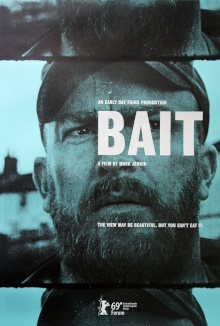This is a relatively recent British film but it looks very old because it was shot on a vintage hand-cranked camera. This anachronism nicely matches the film’s subject matter, about a curmudgeonly fisherman upset about the gentrification of his fishing village. I really wanted to like this and I felt that director Mark Jenkin was being remarkably fair even if his sympathies are obviously with the fisherman. Yet between the technical constraints of his chosen form and the amateurishness of the production, it’s too poorly made to be more than an interesting experiment.
Martin Ward is a fisherman who makes a desultory living catching only small numbers of fish from the shore. He used to work on a fishing boat inherited from his father with his brother Steven. But as their fishing village becomes an increasingly popular tourist destination, Steven now uses the boat to ferry tourists on day trips instead. Martin thinks this is a betrayal of their father’s legacy and is feuding with his brother over it. Their family has also sold a house to newcomers from the city, the Leighs, who now use it as a seasonal holiday home and also rent it out to others. Martin resents them and the changes they bring including new parking regulations. Others have adapted to the tourists including the owner of the pub who Martin sells his catch to and another former fisherman who has become a taxi driver. The relationship between Martin and the Leighs become increasingly acrimonious even his nephew Neil, Steven’s son, who works for him dates the son of the Leighs.
This is definitely a story that deserves to be told but it’s let down by how bad the film looks and sounds. I’m prepared to make allowances in the name of anti-realism but too many things get in the way of just enjoying the film. The constant flickering and changes in brightness, the imperfections of the film stock, the overuse of closely cropped shots and so on, are all distractions that make it difficult to concentrate on what is going on. It is very obvious that the dialogue was not recorded on location but were instead dubbed in later as it sounds very fake. Then there’s how the director likes to make sequences of very quick cuts with dialogue laid on top which just makes it feel even more amateurish. I suppose this counts as impressive work for an experimental student film but it’s not something that should pass muster as a serious work.
Martin makes for a fascinating character. He is physically imposing and that makes him intimidating in his confrontations with the Leighs. Yet he never allows his anger to get the better of him. Instead, it is the younger generation from both sides who take action, resorting to physical attacks, vandalism and theft. He’s full of resentment and rage but is powerless to change the village back to what it was. Jenkin urges us to sympathize with him but is also too smart to offer up any facile solution. The father of the Leigh family is eminently punchable but when he comments that like it or not, they’re now part of the same community and have to learn to live together, he’s not wrong either. Given my own values, it’s no surprise that I’m less inclined to side with Martin than most. Change is inevitable and the position of the owner of the pub seems reasonable to me in adapting her business to cater to the tourists. Martin bemoans the loss of the village he once knew but it’s isn’t clear to me what’s so bad about using his father’s boat to ferry tourists instead of fishing.
Sadly, interesting as the premise is, this film is too badly made that I can’t recommend it. Using a vintage camera to shoot it must have been a rewarding exercise to Jenkin but I can’t see how it adds anything of value to the viewer. It’s not enough to me that there is a confluence between this choice and Martin’s attitudes and I’m fairly confident that even taking into account the technical limitations, this film is worse than it should be. The subject of picturesque villages undergoing gentrification deserves a good cinematic treatment but this isn’t it.
